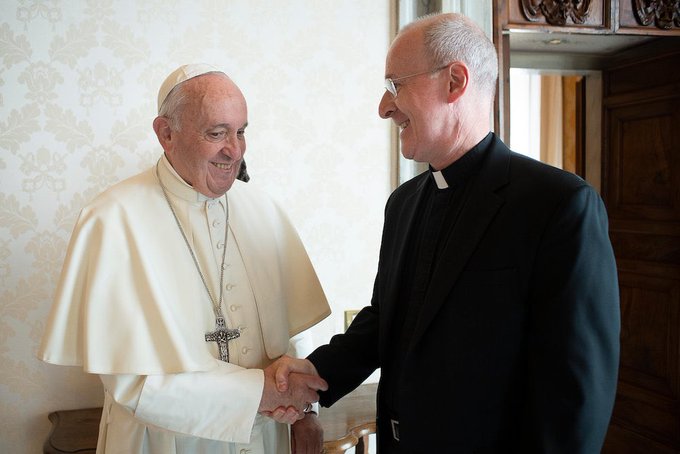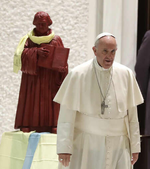As a Jesuit priest for more than two decades, the Rev. James Martin has bestowed thousands of blessings — on rosary beads, on babies, on homes, boats, and meals, on statues of saints, on the sick, on brides and on grooms.
Never before, though, was he permitted to bless a same-sex couple — not until Monday, when the pope said he would allow such blessings, an announcement that reverberated through the church.
On Tuesday morning, Damian Steidl Jack, 44, and his husband, Jason Steidl Jack, 38, stood before Father Martin in a living room on Manhattan’s West Side. The couple, running a bit late because of subway delays, dressed casually.Damian, a floral designer, complimented Father Martin on the pine smell of the Christmas tree.
In keeping with the Vatican’s admonition that such a blessing should not be performed with “any clothing, gestures, or words that are proper to a wedding,” Father Martin wore no robes, and read from no text. There is no blessing for same-sex couples in the thick book of blessings published by the U.S. Conference of Bishops. Instead he selected a favorite of his own from the Old Testament.
“May the Lord bless and keep you,” Father Martin began, touching the two men’s shoulders. They bowed their heads slightly, and held hands.
“May the Lord make his face shine upon you, and be gracious to you. May the Lord turn his countenance to you and give you joy and peace.
“And may almighty God bless you,” he said, making the sign of the cross, “the Father, the Son, and the Holy Spirit. Amen.”
And then, with emotion evident on their faces, the three men hugged.
Father Martin is arguably the highest-profile advocate for L.G.B.T.Q. Catholics in America. He has met frequently with Pope Francis about making the Roman Catholic Church more inclusive, and in the fall he participated in a global gathering on the church’s future at the pope’s invitation.
On Tuesday morning, he was far from the halls of power. He was at home, making history. Father Martin had waited years for the privilege of saying such a prayer, however simple, out in the open.
“It was really nice,” Father Martin said on Tuesday, “to be able to do that publicly.”
The pope’s decision was greeted as a landmark victory by advocates for gay Catholics, who describe it as a significant gesture of openness and pastoral care, and a reminder that an institution whose age is measured in millenniums can change.
The decision does not overturn the church’s doctrine that marriage is between a man and a woman. It does not allow priests to perform same-sex marriages. It takes pains to differentiate between the sacrament of marriage — which must take place in a church — and a blessing, which is a more informal, even spontaneous, gesture. And, a priest’s blessing of a same-sex couple should not take place in connection with a civil marriage ceremony, it says.
News of the pope’s decision spread quickly among gay Catholics, many of whom began preparations for blessings of their own after the busy Christmas season.
On the morning of the pope’s announcement, Michael McCabe’s husband, Eric Sherman, ran into his home office in their apartment in Forest Hills, Queens, bursting with news: Their 46-year partnership could at last be blessed.
“You wait so long for the church to come around, you kind of give up hope,” said Mr. McCabe, 73, who attends Mass every Sunday at the Church of St. Francis Xavier in the Chelsea neighborhood of Manhattan.
The couple married in 2010 in Connecticut, before same-sex marriages became legal in their home state of New York. They had long been resigned to the church’s stance, even if they had not fully made peace with it, Mr. McCabe said.
“I know that myself and my relationship with my husband are good things,” said Mr. McCabe, who taught catechism to first graders at the church.
Although the pope’s decision stops short of recognizing Mr. McCabe’s marriage, he said he could only find the joy in the news. After rejoicing with his husband on Monday, he emailed his priest. They plan to receive a blessing early in the new year.
It wasn’t immediately clear how different priests across the country would respond to the pope’s invitation to bless gay couples. The announcement gives individual priests latitude and encouragement to offer the blessings, but does not require them to do so. Gay couples living in more liberal dioceses may be more likely to find a willing priest than those living in conservative diocesesIn Chicago, Cardinal Blase J. Cupich, a close ally of Pope Francis, issued a statement saying that in his archdiocese, “we welcome this declaration, which will help many more in our community feel the closeness and compassion of God.” Many other bishops have remained mum so far. Conservative critics have said the pope’s move essentially encourages priests to bless sin.
“I’m sure many old bishops are open to this, and many young priests will have to be convinced,” said Massimo Faggioli, a professor of theology at Villanova University, noting that young Catholic priests in the United States are overwhelmingly conservative.
In New York City, where a handful of progressive Catholic churches have been on the forefront of welcoming L.G.B.T.Q. parishioners, but have stopped short of marrying them and sanctifying their unions, the news from the Vatican was just as exciting for some priests as it was for their parishioners.
“I say it is about darn time,” said the Rev. Joseph Juracek, pastor of the Church of St. Francis of Assisi in Midtown, who believes the church is finally aligning with Jesus’ teachings: “This is what he is all about: That God is for all people.”
While many Catholics celebrated the pope’s decision, others felt it was too little, too late. Some L.G.B.T.Q. people who left the church years ago, feeling unwelcome, said it was a half-measure that would not tempt them to return.
Thomas Molina-Duarte, 37, a social worker in Detroit, was an active member of his local Catholic parish for many years. But when he and his husband married, they had to do so in an Episcopal church, and they eventually joined a “home church,” where they gather with a small group to do close readings of texts from the Bible.
“I welcome the news, but it’s not going to make me come back to the church.” Mr. Molina-Duarte said of the pope’s decision. “We’ve found a community of other people that we felt we could bring our full selves to.”
In New York City, Damian and Jason Steidl Jack, who were married last year, had previously discussed the possibility of a blessing with Father Martin, a longtime friend of Jason’s. When Father Martin texted on Monday afternoon and asked if they wanted a blessing, they leaped at the offer.
“God’s grace is at work in our lives, whether the Vatican issues an announcement or not,” said Jason, an assistant teaching professor of religious studies at St. Joseph’s University in Brooklyn and an advocate for gay Catholics. “But we are eager for the support of our communities and of our pastors who look after us.”
Walking back to the subway from Father Martin’s Jesuit community residence, Jason and Damian said the blessing he had given them felt both ordinary and profound.
“It’s one grace of many,” Jason said. They were a part of history, and they were also on their way to meet Damian’s mother at Walmart to shop for Christmas groceries.
“It’s like you said,” Jason told his husband, “It’s like we’re claiming our space.”






